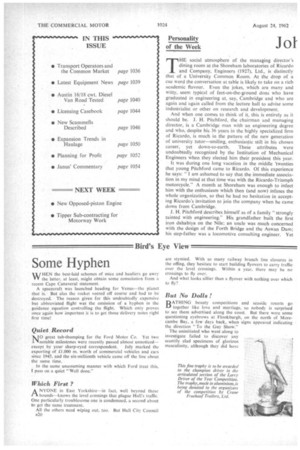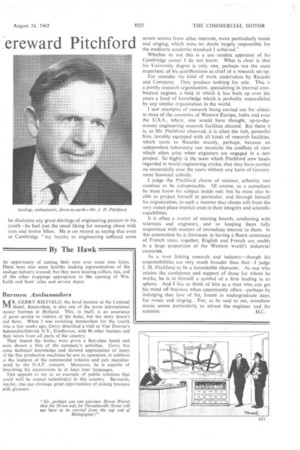Personality of the Week
Page 24

Page 25

If you've noticed an error in this article please click here to report it so we can fix it.
Jol ereward Pitchford
THE social atmosphere of the managing director's dining room at the Shoreham laboratories of Ricardo and Company, Engineers (1927), Ltd., is distinctly that of a University Common Room. At the drop of a cue word the conversation at table is likely to take on a rich academic flavour. Even the jokes, which are many and witty, seem typical of feet-on-the-ground dons who have graduated in engineering at, say, Cambridge and who are again and again called from the lecture hall to advise some industrialist or other on research and development.
And when one comes to think of it, this is entirely as it should be. I. H. Pitchford, the chairman and managing director, is a Cambridge man with an engineering degree and who, despite his 36 years in the highly specialized firm of Ricardo, is much in the pattern of the new generation of university tutor—smiling, enthusiastic still in his chosen career, yet down-to-earth, These attributes were undoubtedly recognized by the Institution of Mechanical Engineers when they elected him their president this year.
It was during one long vacation in the middle 'twenties that young Pitchford came to Ricardo. Of this experience he says: "1 am ashamed to say that the immediate association in my mind at that time was with the Ricardo-Triumph motorcycle." A month at Shoreham was enough to infect him with the enthusiasm which then (and now) infuses the whole organization, so that he had no hesitation in accepting Ricardo's invitation to join the company when he came down from Cambridge.
J. H. Pitchford describes himself as of a family "strongly tainted with engineering." His grandfather built the first iron dahabiya on the Nile; an uncle was much concerned with the design of the Forth Bridge and the Aswan Dam; his step-father was a locomotive consulting engineer. Yet
he disclaims any great stirrings of engineering passion in his youth—he had just the usual liking for messing about with cars and motor bikes. He is on record as saying that even at Cambridge "my loyalty to engineering suffered some
severe strains from other ,interests, more particularly music and singing, which were no doubt largely responsible for the mediocre academic standard I achieved."
Whether or not this is a too modest appraisal of his Cambridge career I do not know. What is clear is that his University degree is only one, perhaps not the most important, of his qualifications as chief of a research set-up.
For consider the kind of work undertaken by Ricardo and Company. They produce nothing for sale. This is a purely research organization, specializing in internal combustion engines, a field in which it has built up over the years a fund of knowledge which is probably unparalleled by any similar organization in the world.
I saw examples of research being carried out for clients in most of the countries of Western Europe, India and even the U.S.A., where. one would have thought, up-to-theminute engineering research facilities abound. But there it is, as Mr. Pitchford observed, it is often the rich, powerful firm, lavishly equipped with all kinds of research facilities, which turns to Ricardo mainly, perhaps, because an independent laboratory can reconcile the conflicts of view which often arise when engineers are engaged in a new project. So highly is the team which Pitchford now heads regarded in world engineering circles, that they have carried on successfully over the years without any form of Government financial subsidy.
.1 judge the Pitchford charm of manner, urbanity and candour to be indispensable. Of course, as a consultant he must know his subject inside out; but he must also be able to project himself in particular, and through himself his organization, in such a manner that clients will from the very outset place implicit trust in their integrity and scientific capabilities.
It is often a matter of meeting boards, conferring with scientists and engineers, and so keeping them fully acquainted with matters of immediate interest to them. In this connection he is fortunate in having a fluent command of French since, together, English and French are usable in a large proportion of the Western world's industrial countries.
As a man linking research and industry—though his responsibilities are very much broader than that—I judge J. H. Pitchford to be a formidable character. As one who retains the confidence and support of those for whom he works, he is in himself a symbol of a firm leading in its sphere. And I like to think of him as a man who can get his mind off business when opportunity offers—perhaps by indulging that love of his, found in undergraduate days, for music and singing. For, as he said to me, somehow music seems particularly to attract the engineer and the
scientist. H.C.








































































































